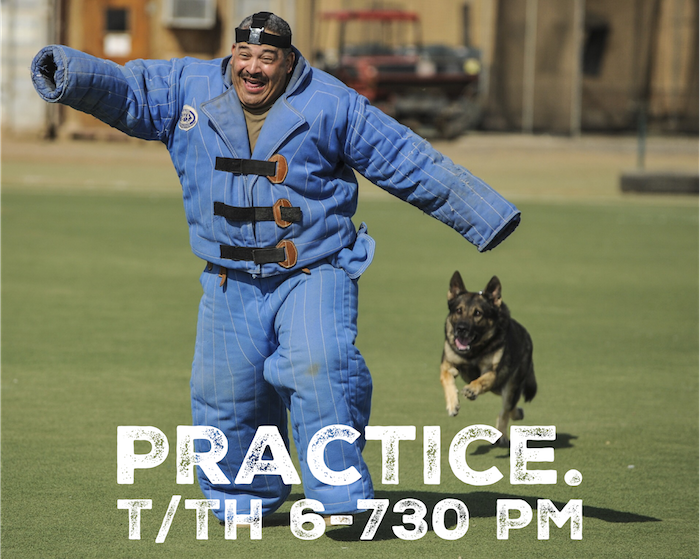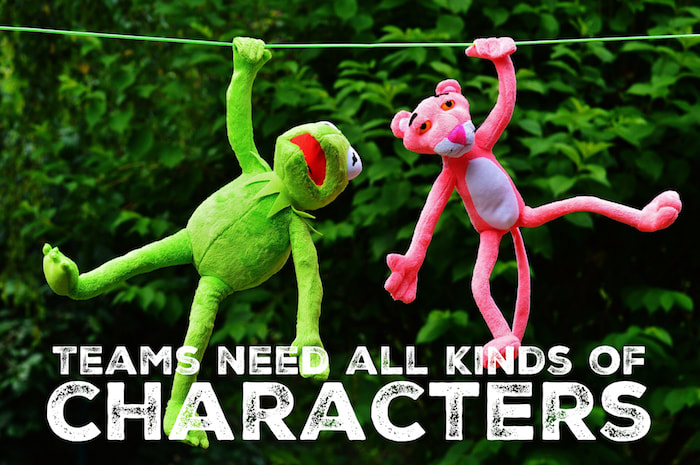|
What makes up a great team? A solid goalie, smothering defenders, ferocious midfielders, and savage strikers?
Not entirely. You need a cast of characters that carry you through the highs, lows, and twists and turns of a season. You want players to take the game seriously, but also those who can make themselves laugh. When leagues choose their teams they look at how to make the them competitive and fun. Sometimes you can't have one without the other. I've been fortunate to have teams that have finished the whole range of 0-8 to 7-0-1 records.
Coaches can make or break how they remember their experience as a player. At the conclusion of the "Being Coached" series, I'll share some characteristics of the players who typically enjoy and excel at the various positions (goalie, defenders, midfielders, strikers, and coaches). These won't be the "perfect size" or the "perfect pedigree"...as I've said this is less relevant than the right character. Of greater importance to teaching a player to score a goal, is to show them that you have their back unconditionally. Players are kids. They're trying to find their place in every situation, everyday. When they fit in they tend to feel comfortable and thrive. Some kids want to be on the edges and this is okay depending on the person. In both cases, they all want to know their coach will support them regardless of whether they play well, behave, or represent the team well.
The line between a player and coach is drawn by the painted lines on the soccer field. Coaches can influence a player off the field, but can only beg/implore a player on the field. Consider these two options: A. "Allison, cover #33 so we don't give up a goal" B. "Allison, you've got your zone locked down" Neither is a great idea because the player is distracted by the coach during the game and it communicates your strategy to the opponent. The difference is that option B is more leading and encourages the player to use their own knowledge of what to do vs. direct orders in option A. Assume you didn't give any instruction/advice to Allison. She has a striker run past her and score an easy goal that gives up a lead. Spice up the scenario and say it's a rival town game. Your team is even more deflated to give up that lead. What do you do in these three instances:
If Allison or her teammates never learn the skill, they will always know that you believed in them and invested the the time to give them a chance. Find that balance where the sideline ends and where you can be more than a game coach. The players need to know that on the field, it's their game. Players of all ages pick up on it when coaches, parents, teammates, and opponents judge them on a variety of factors: skills, fashion, friend groups, and physical size. It hurts and/or motivates them, but it always sticks with them.
Good coaches shouldn't judge immediately, but many do it whether they realize it or not. Your job is in part to put players in the positions that help the team succeed and have fun. To do that, you have to evaluate and make a "judgement" on where the individual players fit best on the team. Be as fair as you can and give everyone a shot at whatever they are interested in. Don't rely on one drill or position in a scrimmage to determine where players are best suited. A strong defender may struggle in another position as one example. Rotate a new group of players to see where they thrive. In some cases, players are happy to stay in one spot. I try to pull them out of that comfort zone on occasion. What happens when you judge a player unfairly (by the players perception)? You start to either lose that player or they set out to prove you wrong, A motivated player is what you want, but not a miserable teammate. The player you've mischaracterized is now focused on proving you wrong vs. making the team succeed. Size is the easiest to misjudge. When you meet a player, you immediately form an opinion whether you want to admit it or not. The key is to give the player a chance to show you what they bring to the team. Until they've had a chance to show you, withhold where you will put them in the figurative formation at game time. This is what you should do at every practice, let the player develop and change your judgement. This creates an environment where players can work, improve, and advance towards whatever their goals are on the team. The dart frog above is tiny, but also the one of the most poisonous frogs on earth. It's toxicity is transferred through it's skin. Misjudging the dart frog is the same as assuming a smaller-sized player is less capable of being ferocious. "Judge my size, please" is a quote I'll never forget. The player is a tremendous defender and a mental and physical leader of the lines she plays on. The fire that was sparked early in her soccer career stuck with her. It's her motivation, and won her a lot of defensive battles with players of "the ideal size". As much as I love this fire and depend on her, I'm most proud to see it put behind her (because she proved to her coaches and herself that she is more than what she was judge to be). Be that coach that inspires in other ways. Give them chance after chance. This is what you are asked to do as a coach. What young players experience on the soccer field carries over into school and other activities. Why do players dread practice at times?
Plenty of reasons, but let's focus on one that will pay off immediately when players are very young and continue through their careers. Run when they run and play the game with them. The team includes the coaches and by participating in practices you'll make a connection. Standing on the field barking out instructions gets old fast and the players sense a disconnect from what you're asking and what they are doing. "Why do we need to do it if you don't?" is what some players are asking themselves. Some coaches may seem offended because the "coach" is the authority figure. You are, but you're not a dictator. You're a teacher and you need to establish trust. How? Some coaches can't physically run with the speed and endurance of their players or even play the game well. Learn with them. This is a way to understand how the instructions and drills you're endorsing apply to the game conditions. Better yet, you'll become the entertainment of the practices when you mess it up or crash and burn. Remember, you're the parent that is on the field playing the game and putting the time into the team. The team concept succeeds and fails together and this includes you as the coach. Many of the best memories my teams likely have are from practices as we laughed, worked hard, and learned how to play the game with a focus on fun. I've been the entertainment with our coaches along with working as hard as anyone. Why? One of the great outcomes of a practice is a unified group that just worked through something together. Everyone will enjoy practice more and learn, including the coaches. After a few seasons of it, it'll seem weird if a coach doesn't get engaged as you did. One of my favorite phrases to hear is, "coach, STOP covering me so much. You're messing me up". If that player can break away from someone bigger, they will have success against their peers. Don't forget to warm up, and stretch too...You aren't as ready for it.  In this series of posts (2of 7), our high school players highlight things they've learned over 10+ years of soccer. First up, building and holding your team's attention and interest. Holding a player's attention during practice and throughout a season is a coach's biggest challenge, regardless of their age. Structured practices and regular communications are important. Being flexible though is even more important. US Soccer's Grassroots framework outlines this balance as "Play, Practice, Play". This provides a sequence of playing as soon as players arrive (1v1 and expand as players arrive), focus on skill development, and apply it in scrimmages. Beyond building the expectation of "having a plan" in each practice, have fun with the team. Your players will mimic your behavior, energy/dullness, and excitement. If you have to break your plan a bit to focus more on a a particular area or roll with something funny that comes up, do it. Focus on getting as much of your plan accomplished while ensuring everyone walks away a better, and happier player. As their coach, I've always tried to make it fun and let them grow into a "self coaching" environment. The coach is responsible for the team while the players can shape what they want out of the team more and more as they mature. As they are coaching themselves now, I see what we've learned together shining through. This is the leadership skill that I've hoped each player can develop. Show them they can make a transition from passive learning to active learning. Build some structure while being loose with it. Have fun. Soccer organizations ask coaches what they need and want to be better coaches. There are a ton of great tools available at the Mass Youth Soccer website for all that. I highly encourage you to take a look as a coach. What I've always asked my players is, "what do you like and hate about coaches".
Over the next several blog posts I'll be sharing the results.
|
Scott Moroney"As a coach, board member and new SYSA VP, I've likely seen and heard a lot of what you may be wondering how to manage as a parent or player. Great kids with supportive parents make it all a "once in a lifetime" experience. Archives
October 2019
Categories |





 RSS Feed
RSS Feed